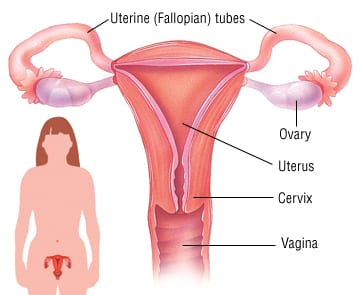Patient Basics: Fallopian Tube Cancer
Originally published by Harvard Health.
What Is It?
The fallopian tubes connect the ovaries and the uterus. Fallopian tube cancer occurs when cells in a tube multiply out of control and form a tumor. As the tumor grows, it presses on the tube, stretching it and causing pain. Over time, the cancer can spread throughout the pelvis and abdomen.
This cancer is very rare. It is more common for cancer to spread to a fallopian tube (usually from an ovary, breast or lining of the uterus) than for a new cancer to develop in it.
Scientists don’t know whether environmental or lifestyle factors increase the risk of this cancer. Some researchers think certain women might inherit a tendency to develop the illness.
There is good evidence that women who inherit a mutation in their BRCA1 or BRCA2 genes have a greater risk of developing fallopian tube cancer. Mutations (changes) in this gene have also been linked to breast and ovarian cancer. If you are diagnosed with this cancer, consider being tested for these mutations.
Symptoms
Symptoms of fallopian tube cancer can include
- abnormal vaginal bleeding, especially after menopause
- abdominal pain or a feeling of pressure in the abdomen
- abnormal vaginal discharge (white, clear, or pinkish)
- an abdominal or pelvic mass.
Having these symptoms doesn’t mean you have fallopian tube cancer. These symptoms can be caused by other problems.
Diagnosis
Because fallopian tube cancer is so rare, your doctor may suspect another gynecological problem. He or she may evaluate your risk for gynecological infections, ovarian tumors, or endometrial cancer. (Endometrial cancer affects the endometrium, the lining of the uterus.) These conditions have symptoms similar to fallopian tube cancer—and they’re more common.
Fallopian tube cancer should be considered when a woman has abnormal vaginal discharge or bleeding and a positive Pap test, but no evidence of cervical or endometrial cancer. If a blood test for CA-125 is unusually high, it supports a diagnosis of fallopian tube cancer. (CA-125 is a tumor marker.) But it does not prove that a woman has this cancer. CA-125 can be elevated for other reasons.
A doctor may suspect fallopian tube cancer if he or she feels a mass during a pelvic exam. Ultrasound or a computed tomography (CT) scan may show an abnormal growth in the area of the tube.
Women often learn that they have this cancer when a fallopian tube is removed to treat another problem. Doctors discover the cancer when they examine it in a laboratory.
If you are diagnosed with fallopian tube cancer, consider getting tested for the BRCA gene mutations. If you have these mutations, you should be tested for breast and ovarian cancers. You should also consider genetic counseling.
Expected Duration
Fallopian tube cancer continues to grow until it is removed. Without surgery, it can spread to other organs.
Prevention
At the current time, there is no way to prevent fallopian tube cancer. Because it is such a rare disease, risk factors have not been identified. As with ovarian and breast cancers, women with BRCA mutations are at greater risk of developing this cancer.
Treatment
Treatment for fallopian tube cancer can include surgery, chemotherapy, and/or radiation therapy.
The extent of surgery depends on the how far the tumor has spread. If the tumor is contained in the fallopian tube, the surgeon will remove the fallopian tubes, ovaries, and uterus. This procedure is called a hysterectomy. If the tumor has spread beyond the tube, pelvic lymph nodes and other tissues may need to be removed.
Following surgery, some doctors recommend radiation therapy. Patients may receive chemotherapy, too, either with or without radiation.
After treatment, blood levels of CA-125 are checked regularly. This can help doctors determine whether any cancer remains or whether the cancer has come back.
When to Call a Professional
Call your doctor if you have abnormal vaginal bleeding, persistent or severe abdominal or pelvic pain, or abnormal vaginal discharge. If you have started menopause, call your doctor right away if you notice vaginal bleeding or a pinkish discharge.
Prognosis
The outlook depends on how far the cancer has advanced. If the cancer is limited to the tube’s inner lining, the prognosis is excellent. However, if the cancer has gone into the wall of the fallopian tube or spread to its outer surface, the prognosis is less favorable.
Additional Information
National Cancer Institute (NCI)
U.S. National Institutes of Health
Public Inquiries Office
Building 31, Room 10A03
31 Center Drive, MSC 8322
Bethesda, MD 20892-2580
Phone: 301-435-3848
Toll-Free: 800-422-6237
TTY: 800-332-8615
www.nci.nih.gov
American Cancer Society (ACS)
1599 Clifton Road, NE
Atlanta, GA 30329-4251
Toll-Free: 800-227-2345
www.cancer.org
American College of Obstetricians and Gynecologists
409 12th St., S.W.
P.O. Box 96920
Washington, DC 20090-6920
Phone: 202-638-5577
www.acog.org
National Women’s Health Information Center (NWHIC)
8550 Arlington Blvd.
Suite 300
Fairfax, VA 22031
Toll-Free: 800-994-9662
TTY: 888-220-5446
www.4woman.org





